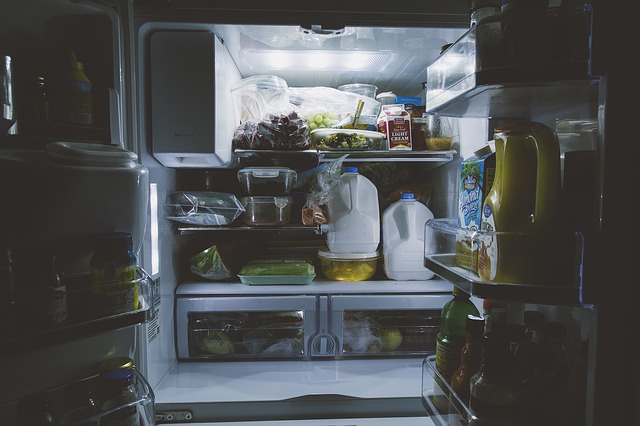Fridgeaphobia, the fear of cleaning out the refrigerator, leaves many people afraid to take the plunge and see what’s behind closed doors.
The symptoms of a fridgeaphobic? USO’s — unidentified shriveled objects littering the shelves, unpleasant odors seeping through the door, and police tape plastered across the front of the refrigerator.
How widespread is this chilling problem? A recent survey by Whirlpool Corporation revealed that 18 percent of those surveyed only clean their refrigerator twice a year, while 5 percent make it annual event, and only clean it once a year. Believe it or not, another 3.5 percent claim they never clean their refrigerator.
To help fridgeaphobics get beyond their cleaning fears, November 15th has been declared Clean Out Your Refrigerator Day . The date was chosen to coincide with the kick-off of the annual Thanksgiving to New Year’s holiday entertaining season.
By observing Clean Out Your Refrigerator Day on Nov. 15, consumers can avoid the holiday nightmare of not having enough room in their refrigerator for the turkey. In addition, purging out-dated products insures that favorite holiday recipes won’t be tainted with less-than-fresh ingredients.
“While cleaning out the refrigerator isn’t the most glamorous job, it’s probably the most important thing you can do in terms of health and safety issues” says Martha Reek, senior home economist, refrigeration, Whirlpool Corporation. “The longer expired, tainted food sits in the refrigerator, or sticky spills remain on the shelf, the higher the risk is for cross-contamination of other foods. Use common sense. Clean up spills immediately and throw away leftovers at least once a week.”
A toll-free number staffed by home economists, registered dietitians and other “refrigerator specialists” will be in service to provide answers to most refrigerator problems. Consumers can call 1-888-CLEAN-OUT, from Nov. 1 – Dec. 1, Monday Friday between the hours of 9 a.m. – 5 p.m. CST.
Reek, working with Whirlpool HomeLife Network Services, an information service established to provide consumers with advice on family, home and appliance-related topics, has developed useful tips for cleaning out the refrigerator.
How To Clean Out A Refrigerator
- Take out all removable parts and wash with warm water and mild soap or detergent. Rinse and dry.
- Wash walls with a solution of two tablespoons of baking soda to one quart warm water. Rinse thoroughly and dry.
- Wash gasket and door liner with warm water and mild soap or detergent. Rinse well and dry.
- For refrigerators with removable drain plugs, remove plug and force warm water mixed with baking soda through the drain. A meat basting syringe works fine for this.
- Wipe down jars, bottles and containers before returning to refrigerator.
- The drip pan underneath the refrigerator is out of sight, so special effort must be made to clean it. Remove it and wash thoroughly with warm, soapy water.
- Vacuum condenser coils two to six times a year (more often in homes with pets).
What Causes Odors in Refrigerators?
- Foods stored uncovered or wrapped improperly
- Poor maintenance–spills not wiped up right away
- Foods left in the refrigerator too long
- Power or mechanical failure that caused food spoilage
- Cleaning agents leaving a strong chemical or fragrant odor
Different Ways To Remove Odors
- Wash interior walls thoroughly with a solution of two tablespoons of baking soda to one quart warm water;
- Pour box of baking soda in jelly roll pan and place on shelves to absorb odors;
- Buy activated charcoal (sometimes available at appliance stores), spread onto jelly roll pans, and place on shelves inside refrigerator;
- Place freshly ground coffee in cereal bowls inside the refrigerator for several days. A slight coffee odor may remain but will disappear after washing the inside of the refrigerator;
- Pack each refrigerator shelf with crumpled newspaper. Set a cup of water on the top shelf, or sprinkle the newspapers lightly with water. This method takes five to six days, but strong odors will be eliminated
There are several commercial products available for odor removal. Some may not rid the odor, but simply mask it while others are not safe for use around food. Read product labels carefully to determine if a cleaner or deodorizer is safe to use in a refrigerator; then follow instructions for use carefully.
How To Prevent Odor Problems
- Discard refrigerated leftovers, vegetables and dairy products that are beyond safe-keeping. They can create odor problems if left too long.
- Promptly wipe up any spills that occur.
- Clean refrigerator out every two weeks.












